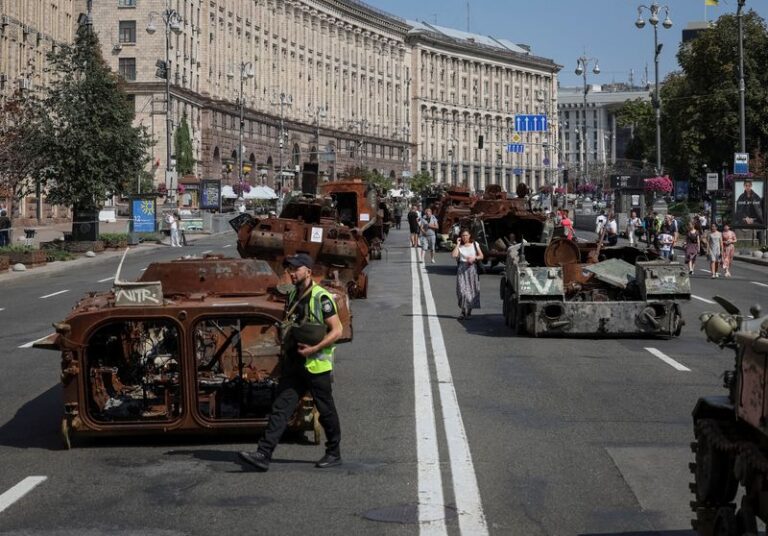
[ad_1]
By Dan Peleschuk and Ivan Lyubysh-Kirdey
KYIV (Reuters) – Ukraine lined up the burnt-out husks of Russian tanks and fighting vehicles along the capital Kyiv’s central drag on Monday as Ukrainians prepare to mark their second wartime Independence Day this week.
The national holiday, which commemorates 32 years of post-Soviet independence from Moscow on Thursday, falls exactly 18 months after Russia launched its full-scale invasion of its southern neighbour.
People walked along Kreshchatyk Street in the heart of the capital staring at the charred shells of armoured combat vehicles and other bits of hardware, arranged in a long line like a military parade of the dead.
Kyiv resident Natalia Koval, 59, expressed horror at what the battlefield trophies represented, but said she was confident Ukraine would eventually defeat Russia.
“Our state will celebrate,” she said. “Yes, maybe not yet – but the moment will come, and this victory will be not only ours but a victory for the entire world.”
The independence holiday, which will be subdued because of the grinding toll of the war, comes at a critical juncture for Kyiv with its counteroffensive against Russian occupying forces making only slow progress in the country’s east and south, well removed from Kyiv, and yet to retake major settlements.
Ukrainian officials say their military’s advance has been hampered by Russian minefields and well-prepared defensive lines, as well as Ukraine’s lack of adequate air support.
They say the Ukrainian death toll is a state secret, but U.S. officials cited by the New York Times last week put the number of soldiers killed during the war at almost 70,000, with between 100,000 and 120,000 wounded.
Residents in central Kyiv said they liked having the wrecked Russian hardware on display and that they hoped it would raise the fighting spirit of Ukrainians.
“I think it’s a good idea to show what our army is capable of doing and…to show how bad (the Russians) are at fighting,” said 23-year-old Mark Omelchenko.
“It’s important to see such examples of our victories.”
Mykola Kaplun, a 74-year-old from the central city of Vinnytsia who was visiting his granddaughter, said he was grateful for Western support in a war which, he conceded, sometimes feels as if it has dragged on too long.
“But the feeling that victory will definitely come has not changed,” he said. “And my intuition tells me that all this will end by the end of the year, with our victory.”
(Reporting by Dan Peleschuk and Ivan Lyubysh-Kirdey; Writing by Dan Peleschuk; editing by Tom Balmforth and Mark Heinrich)
[ad_2]